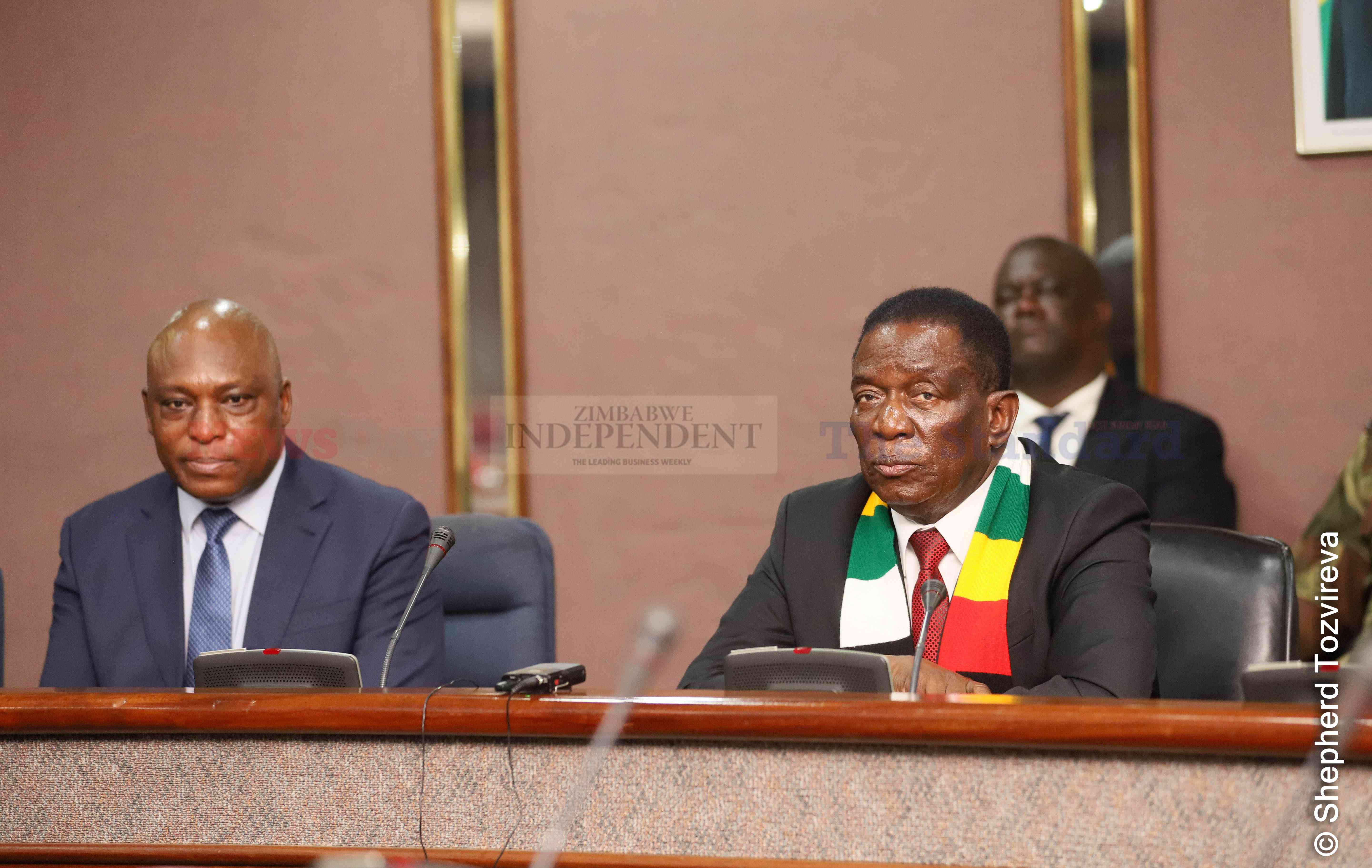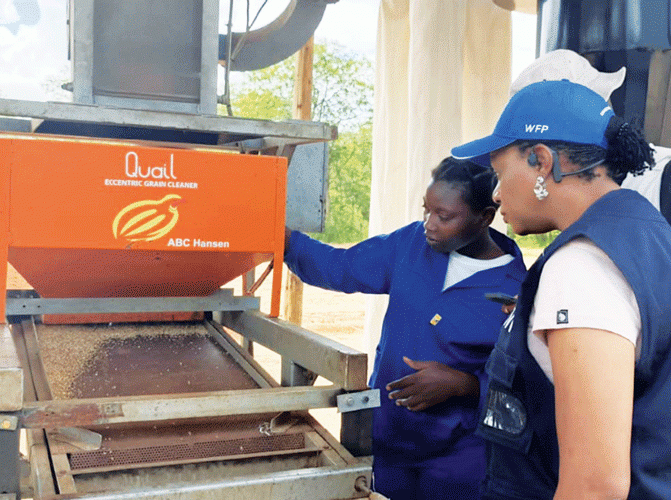
GOVERNMENT has set aside US$575m to bolster the structured currency set to be unveiled today as it moves to ensure the unit survives after its predecessors failed to perform the fundamental functions of money.
The proposed structured currency comes on the back of a sharp depreciation of the local currency against the United States dollar.
The Zimdollar has been elbowed out as a medium of exchange with eight out of 10 transactions being conducted in the greenback, according to data from national statistics agency, ZimStat. Revealing the support yesterday, government said it had gold worth US$175 million as well as foreign currency reserves of US$100 million and US$300 million held by the Reserve Bank of Zimbabwe (RBZ) and Treasury, respectively.
RBZ governor John Mushayavanhu yesterday said he had verified the the assets that the central bank owns, in particular, the cash holding of the gold and other reserves that are in the vaults when he assumed office.
“Upon taking over, I showed the HE (His Excellency, Mnangagwa) the gold that is in the vaults at the central bank that we have 1,1 tonnes of gold, which you saw,” he said.
“We also have other precious minerals in the vaults, diamonds and so forth, which if converted to gold, are equal to about 0,4 tonnes of gold. That makes the total of part of our gold in the vaults converted to gold 1,5 tonnes.”
Mushayavanhu said the central bank had one tonne of gold which is held offshore.
“So, in total, when you talk of gold in reserves, other precious metals, you’re talking of 2,5 tonnes, and converted to US dollars, and today’s price, will be about US$175 million.
- ‘Killer’ soldier granted bail
- NoViolet Bulawayo’s new novel is an instant Zimbabwean classic
- Jah Prayzah, Zanu PF rekindles ‘lost love’
- Letter from America: The death of the Zimbabwe dollar shows the King has no clothes
Keep Reading
“Over and above that, I have also confirmed the cash balances held by the central bank, about US$100 million. So those are the assets I have taken over at the central bank,” Mushayavanhu said.
Finance, Economic Development and Investment Promotion permanent secretary George Guvamatanga added that the government had another US$300 million held in different private banks.
“His Excellency also instructed that we could not have a government without reserves. So, over and above the instructions that came to the central bank, they also came to the Treasury,” he said.
“And, if you allow me, Your Excellency, just for today, to mention that the government of Zimbabwe, not in the central bank, but in several private banks is sitting on reserves of US$300 million.”
He said this could be easily verifiable.
Guvamatanga said the reserves were more than enough to back the proposed structured currency.
“There are government reserves and central bank reserves and if we put that together, we have more than adequate capital cover which is between the Reserve Bank and the government of Zimbabwe,” he said.
“So, the total is more than enough for those who are asking to say, do we have adequate reserves?”
The reserves are about four times less than what the central bank estimates is circulating in the informal sector at a time when government requires billions of dollars in capex.
President Emmerson Mnangagwa announced the introduction of the new currency during his first Cabinet address at State House in February this year.
The structured currency will curb the rapid depreciation of the Zimdollar which had depreciated by about 79%, year to date, to US$1:ZWL10 927,52.
The local currency had depreciated by more than 700% last year to close the period at US$1:ZWL$6 104,72.
Since then, the local currency has depreciated by nearly 142% to US$1:ZWL$26 412,72.
UK-based economist Chenayimoyo Mutambasere yesterday said the reserves were inadequate, adding that the move was ill-timed.
“The last budget statement was set at US$10 billion and this budget already understated social welfare which is now exacerbated by the drought and cholera situation,” she said.
“This latest structured currency gimmick will only serve to profit the political elite as we have observed in the last years. It is an irresponsible, ill-timed strategy.”
Economist and a member of the central bank’s Monetary Policy Committee Persistence Gwanyanya advised the public to wait for the Monetary Policy Statement being released today for details on the rollout of the structured currency.
“Let us not give the wrong impression to the market by commenting irresponsibly on this sensitive matter. Let us give time to let the monetary policy be announced so that we know what actually the structured currency is all about,” he said.
“I want to advise my colleagues not to comment recklessly and ill-advise the innocent society so that they take the wrong stance. For now, I will reserve my comment until the monetary policy is announced. We need to be careful because we might depress the market.”
Typically, a structured currency is a set of guidelines that govern a currency’s exchangeability with other currencies as well as provide a backing system to preserve its value.
This will be the fourth time the government has tried to introduce a stable legal tender in the country after bearer cheques, bond notes and the Zimdollar.
Meanwhile, legislators this week called on Ncube to explain to Parliament the run-away foreign currency exchange rate.
The lawmakers made the call during the Question and Answer Session on Wednesday arguing that Zimbabweans were suffering due to the galloping exchange rate.
Proportional Representation legislator Tabeth Murwira said: “People are being troubled because of the exchange rates which are going up on a daily basis. As I speak, the exchange rate is 1:45 000. What is government’s policy on that?”
Chikanga legislator Lynette Karenyi-Kore said lawmakers had been waiting for Ncube for a long time, adding that his address was long overdue.
“Things are not well out there, the minister should come as soon as possible so that we know what he has under his sleeve,” she said.
In his contribution, Marondera Central legislator Caston Matewe said RBZ’s foreign currency auction system was not functional.
“We want to know where these rates are coming from because it is not working and has not been happening. The minister has to be honest and answer questions as they come and not joke around when people are suffering in this country.”
Acting leader of government business in Parliament Amon Murwira said government was working hard to stabilise the economy.
“Our policy is to see and try by all means that our currency is strong. There are a lot of steps which are being taken but these steps will be articulated by the Minister of Finance in the shortest period of time,” he said.
However, National Assembly deputy speaker Tsitsi Gezi said Ncube would address the House soon.
“The Minister of Finance will bring a ministerial statement, so we should leave it at that,” she said.










